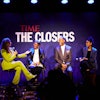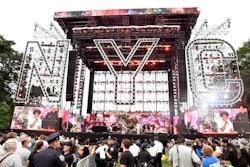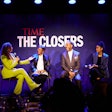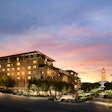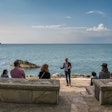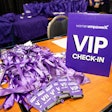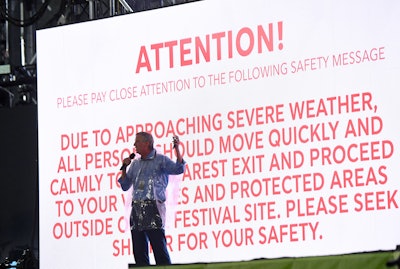
Halloween is almost here, and we're in the mood for scary stories. But for event professionals, the spookiest tales don't involve ghosts or zombies... instead, ours involve unexpected weather, vehicle breakdowns, performers who are MIA, and AV disasters.
We asked readers to share their biggest event horror stories and how they managed to save the day—along with the lessons they learned in the process.
Frank Supovitz, founder and president of Fast Traffic Events & Entertainment and the author of What To Do When Things Go Wrong
The disaster: Supovitz describes this as "a story that better informed our contingency planning after the fact." "When the Boston Bruins hosted the NHL All-Star Game, we passed on having their beloved, long-time ‘house anthem singer’ perform 'The Star-Spangled Banner' on national television in favor of a famous personality who was strongly identified with the city," he explains.
The team arranged to fly the subject in from Miami with just enough time to do his sound check before the doors opened—but when a car arrived at the airport to pick him up, they realized he had never boarded the plane.
The solution: “Luckily, we were able to reach the team’s anthem singer, who was hosting a viewing party at his home," Supovitz remembers. "He grabbed his tuxedo and made it to the arena just in time to perform.”
The lesson learned: Always have a backup plan. “From then on, whenever we booked a national personality to perform the anthem, we always invited the team’s usual singer to enjoy the game as our guest—and to bring their tuxedo just in case we experienced another no-show!" he says.
Josh Wood, founder and CEO of JWP/Josh Wood Productions
The disaster: In September 2021, Wood and his team were producing an outdoor Nas concert at Forest Hills Stadium in Queens, N.Y., a benefit for local nonprofit City Harvest. That is, until a flash flood hit. "The rain was so heavy that people died in other locations around the city. We had to freeze all entries and exits (and) so many people were locked out of the stadium in the pouring rain and lightning—right at the moment the concert was beginning," he remembers.
The solution: “We followed the guidelines for safety and shut down the concert completely with thousands of people inside. Everyone received rain jackets (thousands of them) and enjoyed all the food that City Harvest had prepared for guests," Wood says, adding that once the lighting and wind stopped, the team was able to continue operating the show in the rain.
"Nas was a pro. He waited in his trailer and once it was safe, he performed in the rain on the stage and everyone watched the show. It was still pouring rain, but the crowd was very happy. It was an incredible night."
The lesson learned: Communication—and a great attitude—are key. “My business partner Mimi Eayrs and I spent all evening going back and forth between our clients at City Harvest; the venue team at FHS, who was communicating with the National Weather Service; and Nas’ team," Wood says. "I just made jokes and kept smiling. That’s showbiz.”
Rhina Torres and Jen Pace, event planners for Corporate Travel Management's Event Travel Management (ETM) division
The disaster: “We planned an event for an aerospace client and their customers this August for 400 attendees,” Torres says. “Our lead planner was out due to COVID illness—a very real situation that can happen to anyone and should be planned for." Fortunately, Torres was able to take over, and everything seemed smooth—until Hurricane Ian was projected to hit, which made it difficult for the destination management company vendors to make it on-site.
The solution: “Our ETM planner, Jen Pace, came up with the amazing idea to house the group overnight so they could get there before the hurricane’s landfall, do the event, and then leave after the coast was clear,” Torres explains. “The client approved, and we were able to have two amazing theme nights!”
The lesson learned: Think outside the box, and get ready to problem solve, says Pace. “Things don’t always go the way (they're) planned, so that’s why it’s important to have a plan B or even a plan C."
Pace also adds that having good relationships and contacts proved to be key in this situation. "You can start making calls to your contacts to get a feel for what is happening locally so you can really understand what the circumstances are," she notes. "For example, while trying to place emergency responders into areas that had been affected by a hurricane—the hotels had no power, but some of our clients had access to generators. So, we were able to secure the sleeping rooms if the client supplied the generator to the hotel for use."
Pace continues, "Also, in areas that were fully occupied, we looked at untraditional venues for housing, such as bringing in a cruise ship to a close port so that those rooms could be used for housing.”
Valerie Bihet, director of The Vibe Agency
The disaster: Bihet recalls a time when her team was hired just one month out from an event with nearly 20 speakers—a situation where she'd prefer to have a full day of AV setup, and another full day of tech checks for each person. But "in this instance, the planner between me and the end client had locked into a specific hotel that didn’t have time for us to do two days of prep before the event, so we needed to fit setup and run-through within 12 hours."
As if that wasn't enough, after Bihet began coordinating the presentation across the venue's three big screens, "the planner comes in with a last-minute request to have the same thing on all three at the same time, a part of her vision that hadn’t been shared before due to the short turnaround time," she remembers. "The problem is that the digital files provided were not designed to fit on the screens we had with that type of synced operation.”
The solution: “As a result, I was reworking the video files provided at about 3 a.m. the morning of the show to get it to work on at least one screen and fit appropriately," says Bihet. "Then, I had to talk the planner through why we needed to do the arrangement I had set up for showing presentations on two screens, then main logos, and info for the speaker in the middle. She came around thankfully, but what a crazy last-minute fire drill."
The lesson learned: Keep calm and carry on. "There is no room for emotions when time is so tight and the program needs to happen as flawlessly as possible from the attendees' view,” says Bihet.
 When an aquarium moved her event location at the last minute, Russell was able to negotiate some free add-ons—including a penguin visit for attendees.Photo: Courtesy of Rachel Russell
When an aquarium moved her event location at the last minute, Russell was able to negotiate some free add-ons—including a penguin visit for attendees.Photo: Courtesy of Rachel Russell
The disaster: Russell recalls a time she contracted space at the Aquarium of the Pacific for a client reception. "As the event date neared, the venue realized there was a glitch in their reservation system. Somehow the space had been booked for the same day and time by another group," she says. "Unfortunately, the other group had priority because they signed their contract before we did. Not ideal news when you're an event planner and invitations have already been sent!"
The solution: “I stayed calm by reminding myself that things frequently go awry at events, and attendees are usually none the wiser," she says, noting that she was able to work with the aquarium to determine an alternate space—and this one had the added bonus of a jellyfish touch tank for attendees to interact with. "I negotiated with the venue to add some event enhancements, free of cost, due to the last-minute change," she says. "One of these additions was a penguin visit, which was a highlight of the night!"
The lesson learned: “It just goes to show that if handled calmly and confidently, an event ‘disaster’ can turn into something even better than what you initially planned for.”
The disaster: Russell recalls another example where a fire alarm went off during an all-day training at a hotel—and it wasn't a drill. "We had to evacuate 200 attendees from the building and wait in the parking lot while firefighters arrived. Unfortunately, we were three-quarters through the day, so several people decided to head out early," she remembers.
The solution: “I didn't want the event to end prematurely, so I asked the hotel if it would be possible to start happy hour early," Russell says. "They brought wine outside for the attendees, and after one glass, the building was given the OK for our attendees to return to the meeting. They were able to finish the last session of the day, earn CPE credit, and then resume the reception.”
The lesson learned: “When things go awry, I find it helpful to focus on what I can control," she notes. "It's important to be flexible and find a way to deliver a positive experience for attendees, even when the unexpected happens.”
Justin Lefkovitch, founder, Mirrored Media
The disaster: In October 2016, Mirrored Media was tasked with producing the first-ever west coast iteration of The Race of Gentlemen, a gathering of more than 15,000 automotive enthusiasts and racers celebrating the tradition of American racing and hot rod heritage. Even though California typically has predictable weather in October, Lefkovitch's team was careful to do their research.
"We did exhaustive research about high tide scenarios, consulted tide charts, conferred with local authorities, and even had a bird chaser who was to help protect endangered birds that frequented the race track—but the remnants of a once-in-a-decade typhoon admittedly caught us a bit off guard," recalls Lefkovitch.
The day before the event was to begin, the area was hit with historic rainfall. "We watched the storm surge grow higher and higher until it crept into our event footprint. Thousands of feet of fencing and k-rail, dozens of tents, custom signage, bleachers, generators, restrooms, and countless period-specific props were on the verge of being swallowed by the sea," he says.
The solution: "We quickly raced into action, grabbing every piece of heavy machinery on-site and even wading into the water up to our waists to save everything we could," Lefkovitch says. "We worked together in the pouring rain and crashing waves in the pitch-black night fishing out fencing, signage, tents, and a three-story observation tower. We even borrowed someone's military-grade Hummer H1 to tow items out of the thick wet sand."
In what Lefkovitch describes as a "miracle," the event was able to proceed as scheduled the following day—"albeit at the cost of a sleepless night during a long overnight rebuild," he says.
The lesson learned: Get ready to get your hands dirty. "Though the weather indeed did not cooperate, our team came together to work around the obstacles to produce a standout event, with hundreds of vintage cars, trucks, and motorcycles getting their chance to race on the one-eighth of a mile stretch of wet, but nevertheless operative beach," he says.  “Thousands of feet of fencing and k-rail, dozens of tents, custom signage, bleachers, generators, restrooms, and countless period-specific props were on the verge of being swallowed by the sea,” Lefkovitch remembers.Photo: Courtesy of Justin Lefkovitch
“Thousands of feet of fencing and k-rail, dozens of tents, custom signage, bleachers, generators, restrooms, and countless period-specific props were on the verge of being swallowed by the sea,” Lefkovitch remembers.Photo: Courtesy of Justin Lefkovitch
Ralph Failla, director of client leadership, Inspira Marketing
The disaster: “Vehicle breakdowns always add stress to any situation, and especially when on the job. However, when our beautifully branded Save the Children school bus hit the road from Los Angeles to San Francisco on a nationwide ‘Summer’s Better with Books’ mobile tour, the transmission encountered a major malfunction before its first stop," remembers Failla. "With just 72 hours before the next event, we learned that the transmission could not be repaired—and we were left without a bus for our three-month-long, 25-stop cross-country tour!"
The solution: The team banded together to find a replacement vehicle. "Within 24 hours, we sourced a new bus, had it registered, insured, wrapped with branding, and back underway to its new destination," he says. "Despite the breakdown, we made it to San Francisco with time to spare, and delivered on our promise to the client and to the hundreds of kids eager for the fun, books, and goodies that were to be delivered.”
The lesson learned: Lean on your team. Failla credits the quick recovery to the fact that the whole team rallied and worked together efficiently.
Melissa Park, global event producer, Melissa Park Events
The disaster: Park cites the time she had to fire an event performer—on event day. “I had hired an electric violin act through an agency that, rather than send the performers I saw online, sent a random set they ‘assured’ me would be the right fit," she recalls. "On event day the musicians turned up and I had them perform for me first. One was amazing, one was OK, and one was tragically bad." Park eventually fired the third, and had the other two perform as a duo.
But the problems continued when the performers' tech person wanted to run everything through his own iPad. "I tried desperately to get him to let my tech desk handle it, but he wouldn't budge, so I stopped pushing and let it go," says Park. "Right before they went on stage, his iPad did a system update and he lost everything he'd saved from the rehearsals. All the performers could hear was screaming feedback in their ears. The audio was a high-pitched squeal coming through the speakers for the audience too. Because my tech team wasn't managing it, they couldn't fix it, so we had to watch on in horror. Total disaster!"
The solution: “I went back to the agency and told them all the horrible things that had transpired and got a refund on the booking fee," she says.
The lesson learned: Park quickly learned to never allow any entertainment that requires their own AV. "They use my team or we get another act," she says.
Al Mercuro, senior account director, Genesis Exhibits
The disaster: After 50 years producing live events, Mercuro has his share of disaster stories—but one that stands out dates back to his time as a college student producing a concert series. “I had booked James Taylor to perform. He was on a national tour and playing large venues, but his agent wanted a smaller venue in the NYC area to act as a ‘rehearsal’ for the added horn section and for Taylor’s then-wife Carly Simon to get ready for the tour," he recalls.
But when three tractor-trailers of sound and lighting pulled up that morning, Taylor's lighting director walked in and saw the stage and the slanted roof of the college's small arena, and determined he could not use his lighting rig—and the show would need to be canceled.
The solution: “I had to come up with a quick solution," Mercuro says. "The stage, thankfully, was a modular portable stage, so I was able to get my stage crew to move it to another side of the arena where the ceiling was higher—but by doing this lost 500 bleacher seats. This was Memorial Day weekend, but I was able to reach my chair rental company to deliver another 500 floor seats to make up for the loss of seats. The concert was a great success.”
The lesson learned: Explore every avenue available to find a solution.  Pictured: James Taylor and Carly Simon performing at the 1974 concert that Mercuro produced.Photo: Courtesy of Al Mercuro
Pictured: James Taylor and Carly Simon performing at the 1974 concert that Mercuro produced.Photo: Courtesy of Al Mercuro
Sharon Geltner, event planner, journalist, and the author of Charity Bashed
The disaster: Gelter recalls producing a charitable dinner party in an upscale, gated community in Palm Beach Gardens, Fla., thrown by a pair of up-and-coming philanthropists.
"The wife was dissatisfied that afternoon," Geltner says. "She did not seem to feel secure about her home—some of the finishes had not been completed upstairs—and paced nervously. She kept repeating that she did not have time to get dressed and pull everything together, and the whole thing was too much. She was addressing me and her increasingly discomfited husband."
The solution: Geltner asked how she could help, and when the client didn't have a specific answer, continued asking in different, sympathetic ways. Eventually, "she pointed out how the rental brocade tablecloths were wrinkled and looked terrible for the flower centerpieces due to arrive any minute," she says. "I wanted to strike while the iron was hot—literally—and told her I would press the linens and to please get me the iron. She protested. I insisted and got to work."
Once the tablecloths were ironed, the client was visibly relieved and the party went off without a hitch, says Geltner.
The lesson learned: Be calm, composed, and flexible, advises Geltner, noting that sometimes the trick is narrowing down what the real problem is when a client is unhappy. And "never be afraid to get your hands dirty," she says.
Christopher Falvey, co-founder of Unique NOLA Tours
The disaster: Falvey operates a walking tour company in New Orleans, where he focuses on larger events and private tours for corporate groups. Like many, his disaster came when COVID struck in 2020. "We had a slate of large tours—some up to 400-plus people—that were to go out, but almost canceled because of travel and social distancing restrictions," he says.
The solution: To keep the business, Falvey leaned into the word of the year: pivot. "We made a major pivot to figuring out how to provide an analogous event virtually," he says. "This was not an easy task, as the entire DNA of our tour experience is being in person, seeing the places we present in real life. However, my partner and I dusted off our multimedia skills from previous companies we ran decades ago, pulled some all-nighters, and produced complete history (and ghost!) tours for hundreds of people using video, images, and voice-over in a completely live, Zoom-type setting."
The lesson learned: Utilize skills you may have picked up from past jobs to think outside the box for solutions. Also, "by producing the content beforehand—but most importantly performing it live—the whole event went from disaster to something people very much enjoyed during an extremely trying time for all," Falvey adds.



